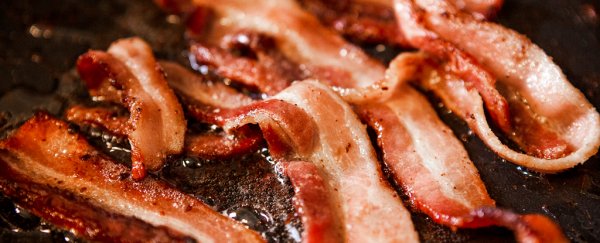Not unlike the movie "Okja," where a company breeds massive pigs to maximize profits, some Chinese farmers are growing larger and larger hogs to keep up with pork shortages.
In Nanning, the capital of the Guangxi province, one farm owner is breeding pigs that weigh over 1,100 pounds – making them the size of polar bears, Bloomberg reports. Gigantic pigs that weigh more than 1,100 pounds (500 kilograms) can sell for more than 10,000 yuan, or US$1,400, which is more than three times higher than the monthly average disposable income in the province.
Adults pigs typically grow to a wide range of weights, usually from 300 to 700 pounds. But the biggest domestic pig on record was Big Bill from Jackson, Tennessee, which weighed 2,552 pounds. Big Bill had to be put down before it could travel to the Chicago World Fair in 1933 because it broke its leg from sustaining all of its weight.
Most hugely over-sized pigs do end up dying from health complications. In 2004, another massive hog named Ton Pig, bred in China, died from a lack of mobility due to its own obesity. It weighed 1,984 pounds (900 kilograms).
The giant pigs bred in Nanning are intended for slaughter, anyways, but larger-sized hogs are becoming more necessary for farmers to support themselves as the African Swine Flu devastates pig populations in Asian countries.
China is breeding giant pigs the size of polar bears https://t.co/MYitvaoqnq
— Bloomberg (@business) October 6, 2019
China is the world's largest pork consumer, accounting for more than half of global pork consumption. Small farmers and large pork corporations in the country are all gearing toward growing larger hogs, Bloomberg reports, attempting to increase the average weight by 14 percent, to boost profits by 30 percent.
The Chinese government has warned that supply will be "extremely severe" in the first half of 2020, due to the shortages, with Chinese farmers having to kill a third of their supply. The pork shortage is estimated to reach 10 million tons.
The outbreak meant farmers had to kill an estimated 250 to 300 million animals, in an attempt to stop the spread of the disease. Government officials are urging hog farmers to start normal production as soon as possible, to increase the domestic supply of pork, but farmers are wary of contamination.
In addition, piglets and breeding sows are becoming more expensive in China, a result of the mass culling. The demand for pork will likely cause global pork prices to rise, as well.
This article was originally published by Business Insider.
More from Business Insider:
